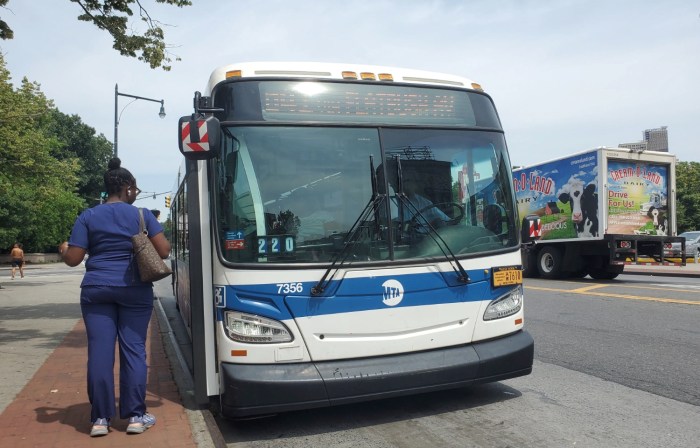Eases Restrictions, Promotes Growth
The City Council unanimously approved last Tuesday, Apr. 9, several bills aimed at easing regulatory burdens on the city’s small businesses.
The passed bills were a result of the Regulatory Review Panel-a joint effort by the Mayor and the Council-to scrutinize city regulations, make recommendations for reform and eliminate unnecessary obstacles that hinder business growth.
In an ongoing effort to make New York greener, the City Council also passed a bill to study the feasibility of developing geothermal energy resources in the city.
All of the bills were passed 49-0 by the City Council during their stated meeting last Tuesday. Only City Council Members Daniel Halloran and Rosie Mendez did not cast votes.
Improving the small biz climate
The first bill (Intro. No. 949) require a review by the Departments of Buildings (DOB), Consumer Affairs (DCA), Health & Mental Hygiene (DOHMH), Environmental Protection (DEP), Sanitation (DSNY), Transportation (DOT) and the Bureau of Fire Prevention of the Fire Department (FDNY) to review the rules and laws they enforce for which a fine may be issued.
After this assessment, the agencies must recommend which rules and laws should be changed to in- clude a cure period, warning or other opportunity to fix the problem before the imposition of a fine.
“Given the complexity of regulations facing small business owners, it’s no surprise that thorough inspectors can often find technical violations at a business run by even the most scrupulous owner,” said City Council Speaker Christine C. Quinn. “When steep fines are levied for nondangerous violations against business owners attempting in good faith to comply with the law, it undermines the fairness of our regulatory system. Fines should be avoidable with reasonable efforts-not ‘a cost of doing business.’ This legislation is a step towards restoring faith in the system by making sure fines are a last resort. It’s not fair to slap someone with a fine when a warning would do.”
“As we look to ensure that New York’s economy continues to grow, the relationship the city has with its entrepreneurs will be increasingly important. The new liaisons to local chambers of commerce and other industry groups, will help keep the lines of communication open, enabling city agencies to become more responsive to their questions and concerns,” added Deputy Majority Leader Leroy Comrie. “This package of legislation will help enhance the relationship between the city and small businesses, while simultaneously easing fines and streamlining the regulatory process.”
“Intro. 949-A emphasizes compliance through education, transparency and outreach not punitive measures. It is what the small business community needs and it is what New Yorkers at large need,” said City Council Member Diana Reyna.
The Council also approved Intro No. 941, requires the Mayor’s Office of Operations to develop a standardized customer service training curriculum for inspectors within DOB, DCA, DOHMH, DEP, DSNY and the Bureau of Fire Prevention in the FDNY. The program must include information on assisting non-English speaking business owners.
Small business owners have an obligation to abide by the rules and to operate safely, legitimately and fairly, the Council noted. Inspectors have an obligation to ensure that these rules are being followed. However, inspectors must provide a service that is respectful and understanding of non-English speakers. The training required by this bill seeks to achieve these goals.
Another concern often expressed by business owners is that they do not know who to contact in city government when problems arise, often leading to confusion and frustration.
To this end, the Council passed Intro. No. 942, that requires the Chief Business Operations Officer in the Office of the Mayor to ensure that the DOB, DCA, DOHMH, DEP, DSNY and the Bureau of Fire Protections of the FDNY each designate an employee to serve as a liaison to the agency’s regulated community, and that each liaison meet regularly with the members of that community.
The liaisons will be independent of the agencies, reporting directly to the Office of the Mayor.
This legislation aims to give businesses added support when navigating city government so concerns can be addressed more quickly and efficiently.
Finally, the Council approved Intro. No. 956, which amends Local Law 18 of 2010 that requires the publication of a Business Owner’s Bill of Rights. Under the bill, a physical copy of the document must be distributed at all non-undercover inspections, which was not previously required. This bill aims to ensure that small businesses are getting as much use out of the Business Owner’s Bill of Rights as possible.
“The ‘Business Owners Bill of Rights’ is an integral piece to help business owners understand their full rights during an inspection process. By now making it compulsory for inspectors to hand out a copy of the Business Owners Bill of Rights, at the time of their visit, will ensure that businesses are well informed on what to expect before, during and after an inspection by city agencies,” said City Council Member Karen Koslowitz.
Geothermal energy study
Geothermal energy is the earth’s natural heat energy. By utilizing heat pumps and other technologies, the heat differential between the Earth’s crust and the surface can be utilized to heat buildings in the winter, cool them in the summer and generate hot water yearround.
With the right technology, the Council noted, geothermal energy is available almost everywhere, and is an efficient source of renewable energy. Wider implementation of this technology could help reduce the city’s greenhouse gas emissions to meet the requirements of the New York City Climate Protection Act.
The Council passed last Tuesday Intro. No. 694, which requires the Office of Long-Term Planning and Sustainability to study the feasibility of developing geothermal energy resources in the city. This study would include a map that visually estimates areas of the city that may be appropriate for geothermal energy.
It would also examine the possibility of installations in existing buildings, the feasibility of shared geothermal systems for clusters of buildings and would make recommendations to promote the use of these systems.
“New Yorkers may not realize that there is an unlimited supply of clean, renewable energy right underneath their feet. Geothermal energy involves harnessing the power of the sun’s rays stored in the upper levels of the Earth’s crust. This bill clears the way for a comprehensive study into unlocking this enormous energy potential for homes and businesses throughout our city,” said Council Member James F. Gennaro. “Already there are local ‘green’ businesses ready to reap the economic benefits of geothermal energy.”

































